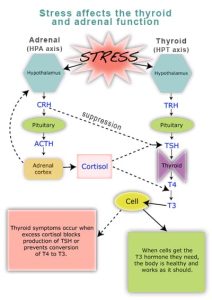Our body’s intricate nervous system plays a pivotal role in safeguarding our overall health and vitality. Not only does it regulate essential functions like our stress response and heart rate, but it also manages many other physiological processes. Stress, when left unmanaged, can trigger detrimental effects, including an underfunctioning thyroid. When this occurs over an extending period, it becomes a breeding ground for chronic health concerns – conditions such as high blood pressure, diabetes, thyroid imbalances, chronic inflammation and digestive disorders.
The thyroid is particularly affected by chronic stress as the stress hormones suppress the functioning of the thyroid. The HPA axis is a complex interaction between the hypothalamus, pituitary gland and adrenal glands. When there is a stressful situation, the hypothalamus releases CRH (corticotropin-releasing hormone) which stimulates the pituitary gland to produce ACTH (adrenocorticotropic hormone). ACTH stimulates the adrenal glands to release cortisol, the primary stress hormone. High levels of cortisol suppress TSH leading to decreased thyroid hormone synthesis and release. 
The thyroid gland is one of our metabolic regulators which means that having low thyroid function can feel like brain fog, fatigue, weight gain, sluggishness, cold intolerance, infertility, hair loss, poor memory & concentration.
This is why managing stress and supporting our nervous system is an important part of any naturopathic treatment plan or overall health. As part of a naturopathic consult, we look at the intricacies of daily and chronic stressors, alongside creating a tailored diet and lifestyle approaches to either mitigate stress or enhance the body’s resilience. Among these practical strategies, often I will prescribe specific herbs and nutrients to help the body deal with stress. Treatment goals may be correcting nutritional deficiencies, tonifying or correcting various body system and biochemical pathways, lowering cortisol levels or supporting the adrenals, promoting restorative sleep and lowering inflammation.
Some practical ways to manage stress and support the body that you can start doing now:
- Stay hydrated – dehydration is stressful on the bod so make sure to hydrate!
- Having a healthy diet: in particular eating enough to give the body the nutrients it needs. Skipping breakfast can be a culprit to an increased stress response!
- Regular exercise – listening to the body and having regular movement. Take care not to exercise to the point of exhaustion!
- Mindfulness and meditation: can help calm the mind and reduce the fight-or-flight response. Spend a few minutes each day in meditation or deep breathing to relax your nervous system. Relaxation techniques can also help soothe – maybe this is yoga, aromatherapy, walking in nature or gardening. Find what you enjoy and works for you.
- Adequate sleep: prioritise quality sleep to allow the nervous system time to recover and rejuvenate. Stick to a regular sleep schedule and create a relaxing bedtime routine.
- Limit stimulants: reduce intake of caffeine, alcohol and nicotine, as they can overstimulate the nervous system.
- Social support: Cultivate strong social connections. Spending time with loved ones and having a support system can reduce stress and improve mental health.
- Time management: organise your daily activities, set realistic goals and avoid overloading your schedule to prevent excessive stress. Saying no can be a positive thing for you health sometimes!!
This is general advice and doesn’t work for everyone. Seeing your health care professional and working out an individual plan for you can be a key to maintaining the nervous system and not letting stress get the better of you!
I am available for consults to help you manage your stress or investigate any potential thyroid/adrenal or hormonal imbalances. I am available for free 10 minute consults to have a chat and see whether naturopathy could work for you. 
